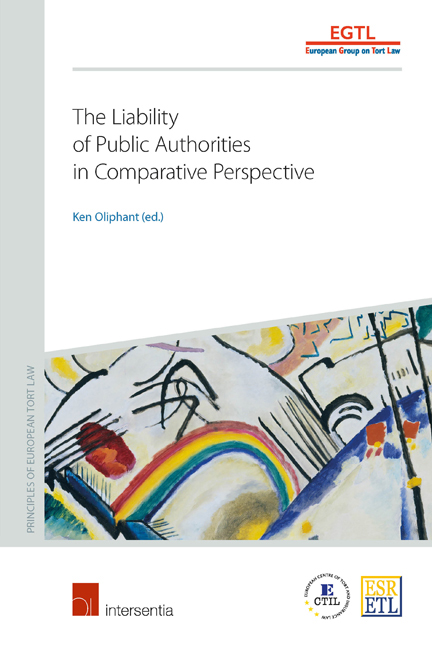Book contents
- Frontmatter
- Preface
- Contents
- List of Authors
- Introduction
- Questionnaire
- PART I PUBLIC AUTHORITY LIABILITY OUTLINED
- PART II CASE STUDIES
- Case 1 Negligent Safety Certification (Maladministration)
- Case 2 Wrongfully Cancelled Licence (Improper Administrative Decision)
- Case 3 Missing Warning (Improper Administrative Omission – Omission following Prior Creation of Risk)
- Case 4 Fireworks Store (Improper Administrative Omission – Pure Omission)
- Case 5 Unfounded Criminal Charges (Prosecutorial and Judicial Acts)
- Case 6 Unpasteurised Cheese (Possibly Improper Regulatory Act – Improper Regulatory Omission)
- Case 7 Police Cross-fire (Properly Conducted Administrative Activities)
- PART III CONCLUSIONS
Case 1 - Negligent Safety Certification (Maladministration)
from PART II - CASE STUDIES
Published online by Cambridge University Press: 27 November 2017
- Frontmatter
- Preface
- Contents
- List of Authors
- Introduction
- Questionnaire
- PART I PUBLIC AUTHORITY LIABILITY OUTLINED
- PART II CASE STUDIES
- Case 1 Negligent Safety Certification (Maladministration)
- Case 2 Wrongfully Cancelled Licence (Improper Administrative Decision)
- Case 3 Missing Warning (Improper Administrative Omission – Omission following Prior Creation of Risk)
- Case 4 Fireworks Store (Improper Administrative Omission – Pure Omission)
- Case 5 Unfounded Criminal Charges (Prosecutorial and Judicial Acts)
- Case 6 Unpasteurised Cheese (Possibly Improper Regulatory Act – Improper Regulatory Omission)
- Case 7 Police Cross-fire (Properly Conducted Administrative Activities)
- PART III CONCLUSIONS
Summary
G is a State agency that has responsibility for licensing commercial pleasure boats to ensure their safety; possession of a licence is a condition for the use of such a boat for fee-paying passengers. G's inexperienced inspector, H, certifies the safety of a commercial pleasure boat owned by I, but has overlooked a defect in the structural soundness of the boat's hull that should have been apparent to an experienced inspector. I is unaware of and could not reasonably been expected to discover the defect. The boat consequently springs a leak while on water with passengers and sinks. I is trapped underwater for a period, and suffers brain damage from oxygen deprivation. One of his passengers, J, drowns.
I now seeks damages from G and/or H (and/or the State) for his loss of profit, the loss of his boat and his personal injury. J's dependants also seek damages from the same defendants. G wonders whether, if it is held liable, it would be able to recover an indemnity from H. Would it make any difference to this claim if H had been aware of the defect but took a bribe from I to certify the boat's safety anyway?
AUSTRIA
Both I and J's dependants can claim compensation from G if H was acting out of G's own authority, otherwise the prime – and ultimate – payor of compensation under the AHG is the entity from whom G derived its authority that was exercised by H. The licensing process seems to involve safety checks, which undoubtedly have the purpose of protecting the well-being of those aboard. The problems with the hull should have been identified in the course of the inspection and are therefore clearly within the scope of the licensing process. The lack of H's experience can of course not serve as a defence since the standard of care owed is defined by the expertise of a person duly performing such tasks in general. Direct actions against H are cut off by §9 para 5 AHG.
- Type
- Chapter
- Information
- The Liability of Public Authorities in Comparative Perspective , pp. 621 - 660Publisher: IntersentiaPrint publication year: 2016

